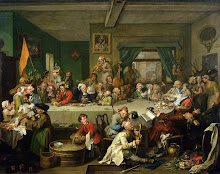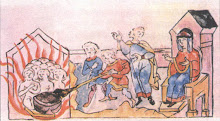
"...This blog is up for an award? What the
hell?"
Yes, strange though it may seem. One of my favorite people of the interwebs,
Pauline, that Friend of Poe and nautical historian extraordinaire, has included me in her list of nominations for the Very Inspiring Blogger award. I was, naturally, quite surprised by this, as I am not known for inspiring much of anything, except perhaps calls to the police. Needless to say, however, I am humbly flattered and grateful.
With the nomination goes a certain amount of responsibility. It seems that I am to not only give all of you seven facts about myself, but to nominate seven other bloggers for the honor. I must say, I find the latter duty daunting, in view of all the fine blogs out there, and the former frankly appalling. Pauline, old girl, you don't know what you're letting my readers in for with that one.
Well, a deal's a deal. Here are--in no particular order--seven details about yours truly:
1. This may come as a great surprise, but I'm a really big fan of Edgar Allan Poe.
2. My mother was a psychiatric RN and my father a Hell's Angel. Yes, I know. It explains a lot.
3. I can't stand avocados. And mushrooms. And eggs. In other words, to me, Hell is an omelet.
4. I spend a disgraceful amount of time at the racetrack, where I have somehow become a well-known figure around the local circuit. Can't think why. In my defense, however, I plow all of my ill-gotten gains into donations to the many deserving thoroughbred rescue/adoption/retirement organizations connected to the sport, such as
Old Friends, Tranquility Farm, United Pegasus, Friends of Ferdinand, and too many others to list here. They all do great work, and are sadly in need of donations. (Hint, hint...)
5. I consider the four main food groups to be red wine, coffee, cheese, and Trader Joe's Dark Chocolate With Almonds bars.
6. When I was three, one of my aunts was studying "Macbeth" in college. I was a very curious child--in every sense of the word--so I read it along with her. I became enamored with the scene where the witches are casting their spells ("Double, double toil, and trouble/Fire burn, and caldron bubble/Filet of a fenny snake/In the caldron boil and bake...") I wound up memorizing that whole passage, and for quite some time afterwards, I'd recite it at unexpected moments. It was, I am told, quite startling to people who didn't know me.
7. The only actor I've ever really swooned over is Lane Davies, who was on a quite nutty but often entertaining soap opera called "Santa Barbara" in the mid-'80s. That was the one soap I ever watched in my life, simply because I was so mad for the guy. I stopped watching in 1986, however, after they got rid of my favorite actress on the show, his onscreen love interest (a giant letter "C" killed her character--no, really) and they paired him up with an actress named Nancy Grahn whom I just loathed. The show, I am told, really went downhill soon after that point and it was eventually cancelled. Serves 'em right.
Well, thankfully, so much for My Back Pages. On to the nominations! It was quite difficult for me to narrow it down to seven, so I decided to concentrate on blogs or bloggers that have some sort of a Poe connection. I settled on the following, with my apologies to everyone I was forced to omit:
1.
Edward II. Kathryn Warner's excellent blog deals with a completely different era, but her ongoing efforts to present the truth about this controversial king reflect what I have been attempting here. She has--only in a far more erudite and impressive style than anything I've done--shown the world the truth of Henry Ford's words, "History is the bunk."
2.
Kristi P. Schoonover. Staunch Friend of Poe, and a fine writer.
3.
Maria, aka @__Nevermore__. OK, I cheated with this one. She, unfortunately, does not have a blog, but her Twitter account is a must-follow for Poe fans. The Ninja Death Rays she sends out to anyone who does our Edgar wrong make me look like Rebecca of Sunnybrook Farm. Great stuff.
4.
The Midnight Society. A walk on the weird side of Richmond, Virginia. What could be more Poe?
5.
The Sump Plug. For anyone following the Lenore Hart Wars,
this post alone was an instant classic. As I explained in an earlier post, Archie Valparaiso not only decimated any claim Hart had to credibility, but he simultaneously demolished the legend--which I had long questioned--of Poe and Virginia's alleged honeymoon trip to Petersburg. For a Poe geek, it doesn't get much cooler than that.
6.
Lifetime Reading Plan. Poe fan. Reader. Knitter. Great blog for anyone with a passion for books.
7. Last, but certainly not least, is none other than
Rufus W. Griswold. "What?" I can almost hear you saying. "You're honoring your Twitter Nemesis, that infamous scoundrel, that sworn foe of all things Poe? How can that be, Undine?"
I'll tell you. I am bestowing this tribute to the Reverend for one very good reason.
I can't wait to see what he'll do with it.Well. Many thanks, once again, to Pauline, even though I suspect this post has tempted her to take the nomination back pronto. Later this morning, I will post my review of the new movie "The Raven," which I saw last evening. In the meantime, I'll sum up the experience in two words: Hoo. Boy.





















